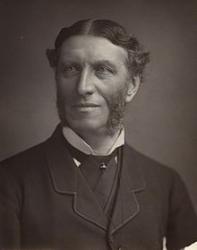Planning worship?
Check out our sister site, ZeteoSearch.org,
for 20+ additional resources related to your search.
- |
User Links
Search Results
Servants of God, or sons
Author: Matthew Arnold (cento), 1822-88 Hymnal: Songs of Praise #123a (1925) Languages: English Tune Title: CUMNOR
Servants of God, or sons
Servants of God, or sons
Author: Matthew Arnold (cento), 1822-88 Hymnal: Songs of Praise #123b (1925) Languages: English Tune Title: OXONIA
Servants of God, or sons
Servants of God, or sons
Hymnal: Songs of praise #213 (1931) Meter: 7.7.7.7.7.7 irregular
Servants of God, or sons
Ralph Vaughan Williams

1872 - 1958 Person Name: R. Vaughan Williams Composer of "CUMNOR" in Songs of Praise Through his composing, conducting, collecting, editing, and teaching, Ralph Vaughan Williams (b. Down Ampney, Gloucestershire, England, October 12, 1872; d. Westminster, London, England, August 26, 1958) became the chief figure in the realm of English music and church music in the first half of the twentieth century. His education included instruction at the Royal College of Music in London and Trinity College, Cambridge, as well as additional studies in Berlin and Paris. During World War I he served in the army medical corps in France. Vaughan Williams taught music at the Royal College of Music (1920-1940), conducted the Bach Choir in London (1920-1927), and directed the Leith Hill Music Festival in Dorking (1905-1953). A major influence in his life was the English folk song. A knowledgeable collector of folk songs, he was also a member of the Folksong Society and a supporter of the English Folk Dance Society. Vaughan Williams wrote various articles and books, including National Music (1935), and composed numerous arrangements of folk songs; many of his compositions show the impact of folk rhythms and melodic modes. His original compositions cover nearly all musical genres, from orchestral symphonies and concertos to choral works, from songs to operas, and from chamber music to music for films. Vaughan Williams's church music includes anthems; choral-orchestral works, such as Magnificat (1932), Dona Nobis Pacem (1936), and Hodie (1953); and hymn tune settings for organ. But most important to the history of hymnody, he was music editor of the most influential British hymnal at the beginning of the twentieth century, The English Hymnal (1906), and coeditor (with Martin Shaw) of Songs of Praise (1925, 1931) and the Oxford Book of Carols (1928).
Bert Polman
Ralph Vaughan Williams
Nicholas Gatty
1874 - 1946 Composer of "OXONIA" in Songs of Praise Nicholas Comyn Gatty (13 September 1874 – 10 November 1946) was an English composer and music critic. As a composer his major output was opera, which was generally musically undistinguished but well-presented theatrically. As a critic he worked for the Pall Mall Gazette and The Times, and served as assistant editor for the second and third editions of Grove.
He was born in Bradfield, Yorkshire, the second son of the Revd Reginald Gatty. He was educated at Downing College, Cambridge (BA 1896, Mus B 1898, Mus D 1927) and studied under Charles Villiers Stanford at the Royal College of Music. At the beginning of the 20th Century he was assistant conductor at Covent Garden and at some time organist to the Duke of York's Royal Military School in Chelsea.
Gatty was a close contemporary and friend of Ralph Vaughan Williams and from around 1900 the latter was to spend summer holidays with the Gattys at Hooton Roberts, between Rotherham and Doncaster, where Gatty's father was Rector. He died in London.
He was the nephew of Alfred Scott-Gatty.
--en.wikipedia.org/wiki/
Nicholas Gatty
Matthew Arnold

1822 - 1888 Person Name: Matthew Arnold (cento), 1822-88 Author of "Servants of God, or sons" in Songs of Praise Arnold, Matthew, M.A., born at Laleham, Dec. 24, 1822, and educated at Winchester and Balliol College, Oxford; B.A. 1845; Fellow of Oriel 1845; Inspector of Schools 1851-1883; Prof, of Poetry, Oxford, 1857-87. He died at Liverpool, April 15, 1888. His conflection with hymnology is very slight. His hymn "Calm soul of all things! make it mine" (Peace) from Poetical Works, 1890, p. 263, is entitled "Lines written in Kensington Gardens."
--John Julian, Dictionary of Hymnology, New Supplement (1907)
Matthew Arnold


 My Starred Hymns
My Starred Hymns


